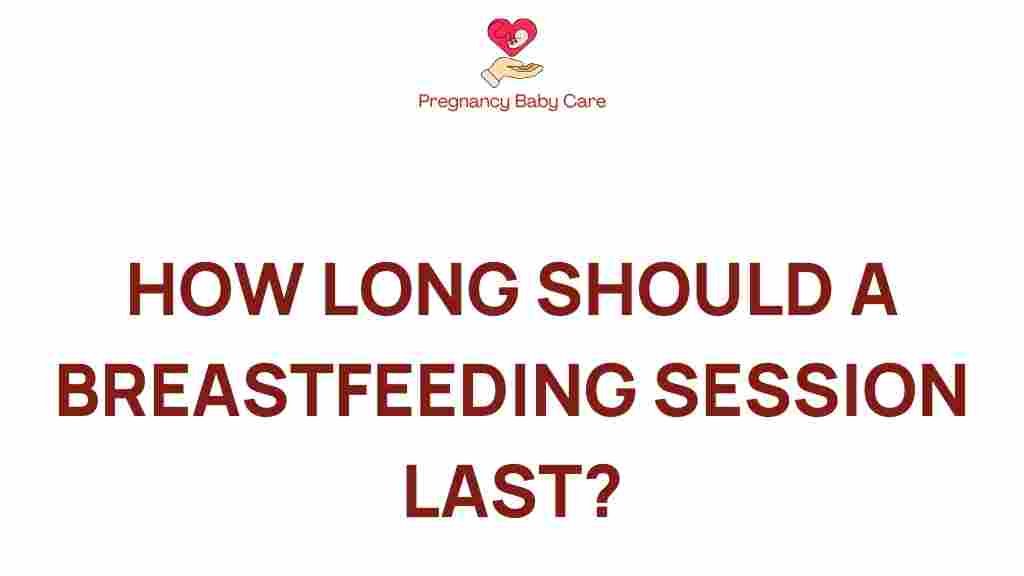The Ideal Duration: How Long Should a Breastfeeding Session Last?
Breastfeeding is a natural and beneficial way to provide nutrition to your newborn. However, many new mothers often wonder about the ideal duration of a breastfeeding session. Understanding the right length of time to breastfeed is crucial not only for the infant’s health but also for maternal health and overall lactation success. This article will explore the factors that influence the duration of breastfeeding sessions, provide tips on effective feeding, and address common concerns related to breastfeeding duration.
Understanding Breastfeeding Duration
Breastfeeding duration can vary significantly between infants. While some newborns may nurse for shorter periods, others might take their time. On average, a breastfeeding session can last anywhere from 10 to 40 minutes. Here are some factors that can impact the duration of breastfeeding:
- Newborn Age: Newborns typically require more frequent feedings as they establish their feeding patterns.
- Milk Supply: A mother’s milk supply can affect how long an infant feeds. If milk flow is slow, the baby may nurse longer.
- Infant’s Hunger Cues: Babies will signal when they are hungry, which can vary from feeding to feeding.
- Feeding Technique: Proper latch and positioning can influence how efficiently a baby feeds.
The Recommended Duration for Newborns
For newborns, the general recommendation is to breastfeed on demand, allowing the baby to dictate the duration of each session. Newborns usually feed every 1.5 to 3 hours, and each session can last:
- 10-15 Minutes: Some infants may be efficient feeders and get what they need in a shorter time.
- 20-30 Minutes: Many babies take this average time to get a sufficient amount of milk.
- 30-40 Minutes: Some newborns may take longer, especially if they are comfort nursing or if the milk flow is slow.
It’s important to note that each baby is unique, and these durations can vary widely. Monitoring your baby’s weight gain and overall health can be a good indicator of whether they are feeding effectively.
Factors Influencing Feeding Duration
The duration of a breastfeeding session can be influenced by several factors, including:
1. Infant’s Development
As infants grow, their feeding patterns change. Newborns tend to nurse more frequently, while older infants may take fewer, longer sessions as they consume more milk at once.
2. Maternal Health
A mother’s health can also impact breastfeeding duration. Conditions such as mastitis or low milk supply can affect how long a baby stays at the breast. Maintaining good maternal health is essential for effective lactation.
3. Breastfeeding Techniques
Using proper breastfeeding techniques can lead to more efficient feedings. A good latch allows the baby to extract milk more effectively, which can shorten the duration of the feeding session.
Step-by-Step Guide to Effective Breastfeeding
To ensure that both you and your baby have a positive breastfeeding experience, follow these steps:
- Find a Comfortable Position: Whether sitting or lying down, make sure you are comfortable to promote relaxation.
- Ensure a Good Latch: Position your baby close to your breast, with their mouth wide open. Bring the baby to the breast, not the breast to the baby.
- Watch for Hunger Cues: Look for signs that your baby is hungry, such as rooting or sucking on their hands.
- Allow Your Baby to Nurse: Let your baby nurse as long as they want. This helps establish a good milk supply.
- Switch Sides: After your baby finishes on one breast, offer the other side to ensure balanced milk intake.
- Burp Your Baby: After feeding, gently burp your baby to help relieve any trapped air.
Troubleshooting Common Breastfeeding Issues
Despite your best efforts, you may encounter some challenges during breastfeeding. Here are some common issues and tips on how to address them:
1. Low Milk Supply
If you are worried about your milk supply, try the following:
- Breastfeed frequently to stimulate milk production.
- Stay hydrated and eat a balanced diet.
- Consider power pumping to increase milk supply.
2. Engorgement
If you experience engorgement, try these tips:
- Nurse or pump regularly to relieve pressure.
- Apply warm compresses before feeding to promote letdown.
- Use cold compresses after feeding to reduce swelling.
3. Difficulty Latching
If your baby is having trouble latching, consider the following:
- Seek assistance from a lactation consultant.
- Try different breastfeeding positions to find what works best.
- Practice skin-to-skin contact to encourage latching.
Breastfeeding Tips for New Mothers
To enhance your breastfeeding experience, consider these breastfeeding tips:
- Stay Patient: It may take time for both you and your baby to get the hang of breastfeeding.
- Track Feedings: Keeping a log of feeding times and durations can help you identify patterns.
- Involve Supportive Partners: Having your partner support you during feeding can make the experience more enjoyable.
- Utilize Resources: Don’t hesitate to reach out to local breastfeeding support groups or online resources for help.
For more detailed breastfeeding support, visit La Leche League International.
Conclusion
Determining the ideal duration of a breastfeeding session can be challenging for new mothers. While there is no one-size-fits-all answer, understanding your newborn’s needs, maintaining maternal health, and observing feeding cues are essential for successful breastfeeding. Remember, breastfeeding is a journey that varies for every mother and baby. By staying informed and seeking support, you can navigate the challenges and enjoy the many benefits of breastfeeding.
For more tips and resources on infant care and breastfeeding, check out this helpful guide on healthy breastfeeding practices.
This article is in the category Feeding and created by PregnancyBabyCare Team
